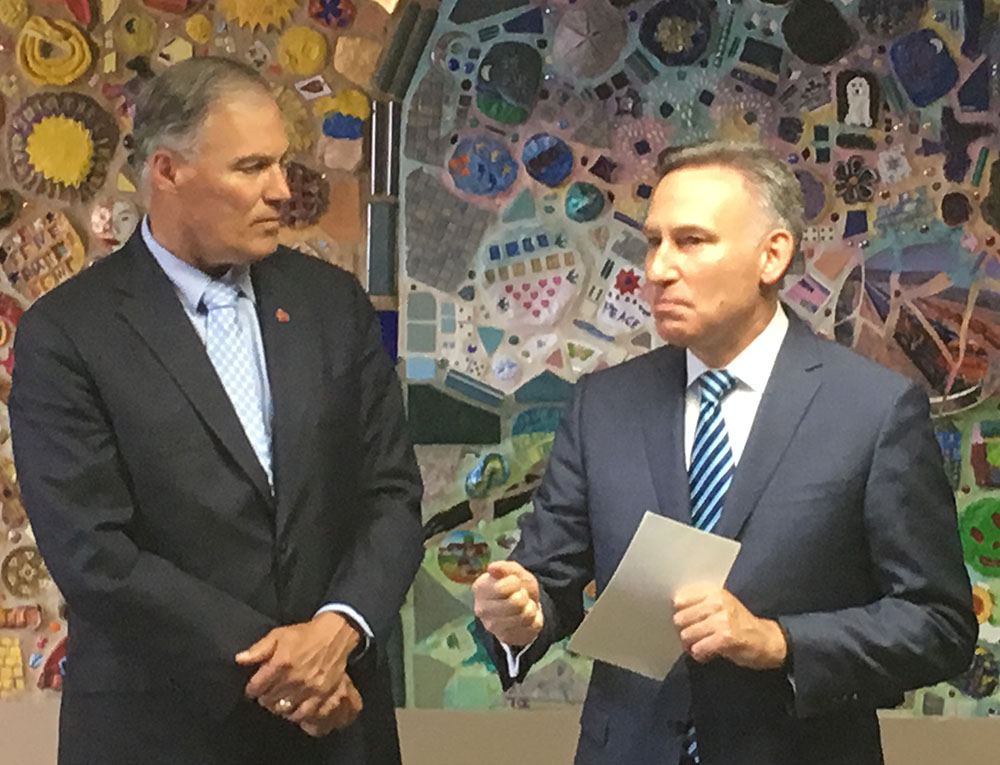Community Alternatives to Boarding Task Force
The right care at the right time in the right place for people in crisis

Washington Gov. Jay Inslee and King County Executive Dow Constantine announced recommendations made by the CABTF during a tour of the West Seattle campus of Navos Mental Health Solutions on July 20, 2016.
The Community Alternatives to Boarding Task Force is creating sustainable solutions to address involuntary treatment demand through increased prevention and intervention, community-based diversion and psychiatric hospital re-entry programs, and increased capacity for both community care and hospitalizations.
Gov. Inslee and Executive Constantine announce CABTF report
The problem
To address the serious shortage statewide of involuntary psychiatric treatment beds, in August 2014 Gov. Jay Inslee and King County Executive Dow Constantine jointly convened the Task Force made up of a broad range of high-level representatives from the legal, judicial, and treatment systems. The lack of treatment beds had created an increasing number of people detained for inpatient care in temporary settings, such as hospital emergency rooms, without adequate psychiatric care while they waited for a treatment bed to open – a process known as psychiatric boarding. A Washington State Supreme Court ruled against that practice effective December 2014.
Download the Task Force's full report
Download If the document won't open in your browser, right-click and "Save as".See the executive summary of the final report.
See the summary of top priority recommendations.
Achievements
- Significantly increased immediate involuntary placement in appropriate facilities following the court ruling
- Established coordinated guidelines to match patients with appropriate treatment settings
- Removed patient placement delays by greatly expanding placement hours
- Streamlined approval process at Western State Hospital that previously caused delays and secured legislation to eliminate key Western State Hospital bottleneck
- Led effort to collaborate with local hospitals to care for involuntarily detained patients, even with stricter guidelines from the state
- Developed innovative and visionary recommendations for future system improvements and targeted resources across the continuum of care
Prevention and early intervention
- Expanded outreach and engagement services
- Quick access to community-based treatment
- Intensive case management to help prevent costly hospitalizations
Crisis diversion
- Mobile crisis outreach teams
- Crisis Solutions Center
- Step-up services to help prevent hospitalization
- More after-hours response
Community-based discharge options
Support psychiatric hospital discharge and re-entry programs to help people successfully return to the community with the services and supports they need to achieve and maintain stability on the road to recovery.
Supporting integrated care
Advocating policy changes to improve the entire system of care by increasing capacity at all levels of care, and support the delivery of integrate care.
Read more detailed information about the Task Force recommendations. Additional context for these recommendations are presented as part of the Task Force’s final report.
NEW: The Task Force’s latest quarterly report updates key metrics and briefly describes progress and next steps toward implementation of its recommendations.
Document library and Task Force membership information
- Full CABTF Final Report
The full report is a large file. Some browsers may not download it immediately. If this happens, try right-clicking and selecting “Save As.” - Executive Summary of the Final Report
- Transmittal Letter for Final Report
- Summary of Top CABTF Priorities
- Summary of All CABTF Priorities, Recommendations, and Endorsements
- System Improvement Recommendation Details
- Update on Projects to Increase Local Acute Care Capacity (Spring 2016)
- News release: Gov. Inslee, Executive Constantine take a big-picture, cooperative approach to state’s mental-health system
- Motion 14225
- CABTF Charter
- In re the Detention of D.W. Supreme Court Ruling
- King County Crisis and Commitment Services (designated mental health professionals)
- Washington’s Involuntary Treatment Act (ITA):
- CABTF Quarterly Reports:
The CABTF is comprised of a broad range of high-level representatives from the legal, judicial, and treatment systems that impact individuals involved in the involuntary commitment process. Participating organizations include the state Division of Behavioral Health and Recovery (DBHR); Western State Hospital (WSH); the Washington State Hospital Association; evaluation and treatment (E&T) providers Harborview Medical Center and Navos; King County Department of Community and Human Services staff; King County’s Involuntary Treatment (ITA) Court; and senior policy advisors for the Governor and Executive.
A full list of CABTF members is here.
The documents above are filled with detail about the Task Force and its recommendations. Still have questions? Email us

 Translate
Translate
